There might be an instance when your car struggles to pick up speed even when you step hard on the gas.
Unfortunately, there can be more than a few reasons why this may happen depending on the model, design, or even the age of the car.
Could it be that the 12V battery is faulty or has a low state of charge? What should you look out for if your car is not able to accelerate?
In this post, you’ll find out if and how a damaged or low battery can cause acceleration problems, and what symptoms you’re likely to experience if the car battery is damaged.
Can a Faulty Battery Lead to Difficulty in Acceleration?
This depends on whether the car uses gas or is an electric vehicle. An electric or hybrid car with a bad battery or low on charge will struggle to pick up speed.
This is because the car motor relies on battery power to not only start but to move and accelerate the car as needed.
If the car uses gas (conventional car) then the battery only affects the car’s ability to start unless the alternator fails to keep up with the electrical power needs of the car as the car moves in which case the car engine will stall.
The car alternator may fail to keep up with the car’s electrical needs in case of a failing alternator, weak or loose alternator, or battery connections (the list is not exhaustive).
Difficulty in Car Acceleration – Conventional Cars
There is an exception to this though. In some cases, the car may run rough or struggle to pick up speed immediately after a battery change until the ECU is reset.
So if the car fails to pick up speed after a battery replacement, it may be that the ECU needs to be reset. Contact a qualified auto mechanic to support you on this.
Why your Car may be Struggling to pick up Speed? (non-electric vehicles)?
Note: The suggestions below are general fixes and are only intended as a guide. Always use a fault code reader or use the services of a qualified auto technician.
If the car struggles to pick up speed as you drive, at a minimum check the following:
#1. The fuel filter in the tank may be clogged. It is possible the car’s fuel filter is clogged with dirt and needs to be cleaned or replaced.
The dirt buildup in the fuel filter can restrict the fuel intake to the engine which in turn affects the car engine performance.
Check when the fuel filter was last replaced. You may need to replace the fuel filter.
#2. The air cleaner may be clogged too. A clogged air filter can also affect the car’s performance especially when the demand for increased performance is high such as when the car is accelerating.
When was the last time the air cleaner was last replaced? Have you been traveling along dusty roads? You may need to replace the car’s air cleaner too.
#3. The car spark plugs may be due for a replacement. Carbon buildup or corrosion affects the spark plug performance which may lead the car to struggle to pick up speed.
When was the car last serviced or spark plugs changed?
You may need to replace the spark plugs to improve car engine performance.
Note: The list above is not exhaustive and is only intended to get you started. Always consult a qualified auto mechanic.
Symptoms of a Faulty Car Battery
Though not conclusive, if the car battery is damaged, you may experience slow cranking or failure of the car to start.
The battery may not be able to hold charge (even without any parasitic loads) after a full charge. You may also be interested in this post: Signs and Causes of a low car battery voltage.
Closing Thoughts
If a car that uses gas is struggling to accelerate it is more likely that it not battery related and could be because of a clogged air, fuel filter or the spark plugs are due for replacement to mention but a few.
Hybrid or electric vehicles will struggle to accelerate if the battery is faulty.
Note: This is not an exhaustive list Always consult a qualified auto mechanic.
Recommended Posts

